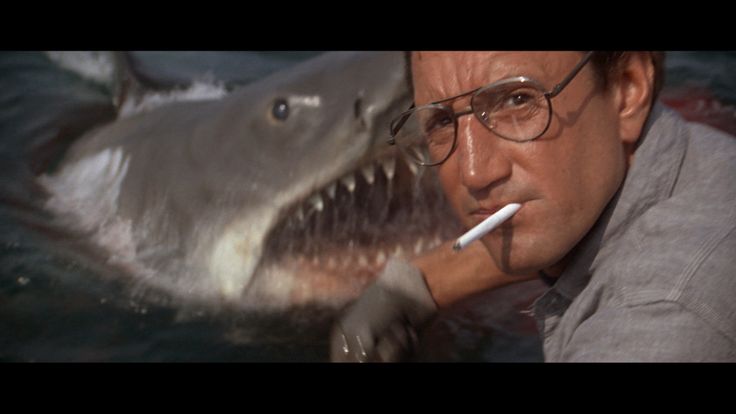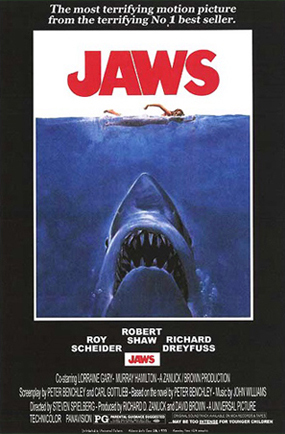Jaws (Reviewed by Lisa Marie Bowman)
There’s little that is more intimidating than trying to write a review of the 1975 best picture nominee, Jaws.
I mean, seriously, what’s left to be said about this film? Jaws is one of those movies that everyone has seen and everyone loves. And, even if someone somehow hasn’t seen the film, chances are that they still know all about it. They know that it’s a movie about a giant shark that attacks Amity Island, just as the summer season is starting. They know that the town’s mayor refuses to close the beaches, because he doesn’t want to lose the tourist dollars. They know that the final half of the film is three men (Roy Scheider, Richard Dreyfuss, and Robert Shaw) floating around in a boat, searching for a shark. And they certainly know that, whenever you hear John Williams’s iconic theme music, it means that someone is about to get attacked.
Jaws is such a part of our culture that probably not a single day goes by without someone saying a variation on “we’re going to need a bigger boat.” Did you know that, on twitter, Ben Gardner’s boat has its own account? And despite getting pretty graphically dismembered about halfway through Jaws, poor little Alex Kintner has an account as well!
What’s amazing about Jaws is that, even though everyone’s seen it and it’s been parodied a few thousand times, Jaws remains incredibly effective. I still find myself cringing whenever the shark catches Alex Kintner and that geyser of blood explodes out of the ocean. I still jump whenever the shark suddenly emerges from the water and scares the Hell out of Roy Scheider. I still laugh at Richard Dreyfuss’s hyperactive performance and I instinctively cover my ears whenever I realize that Robert Shaw is about to drag his nails across that chalk board.
And then there’s that music, of course! Even after being used, misused, and imitated in countless other films, the Jaws theme still fills me with a sort of existential dread. The mechanical shark was notoriously fake-looking and was rarely seen onscreen as a result. The camera and the music stand in for the shark and it works beautifully.
The one unfortunate thing about Jaws is that it’s been so critically acclaimed and so embraced by audiences that I think people tend to forget that it is primarily a horror film. Mainstream critics tend to look down on horror as a genre so, rather than admit the obvious, they claim that Jaws is more of a thriller than a horror film. Or they talk about how it’s actually meant to be a political allegory or an environmental allegory or an examination of male bonding.
So, let’s just make this clear. No matter what the elitist critics or even Steven Spielberg himself may say, Jaws is primarily a horror film, with that relentless killer shark serving as a prototype for such future horror fiends as Michael Myers, Jason Voorhees, Freddy Krueger, and both of the Ghostface and Jigsaw Killers. (Jaws even opens with a stereotypical slasher movie death, as a nude and stoned swimmer is suddenly attacked by an unseen killer.) If not for Scheider, Shaw, and Dreyfuss floating in the endless ocean, you would never have had films — like the Blair Witch Project — about people being lost and stalked in the wilderness. And when that shark attacks and graphically rips apart its victims, how different is it from something you might find in a George Romero or Lucio Fulci zombie film?
On the basis of Jaws and Duel, I think it can be argued that, if Steven Spielberg hadn’t become America’s favorite director of crowd-pleasing, Oscar-contending blockbusters, he could have been one of our best horror directors. Sadly, Spielberg has pretty much abandoned horror and I doubt that Jaws would be as effective if it were made today. (I suspect that the temptation to resort to a cartoonish CGI shark would be too great.)
But that’s all speculation.
What matters is that Jaws remains one of the greatest films ever made.
And it’s a horror film!



1 thought on “Jaws (Reviewed by Lisa Marie Bowman)”